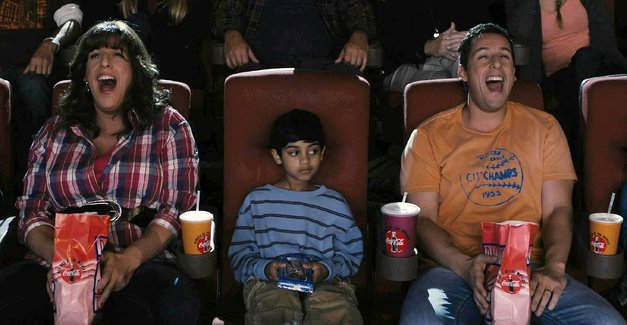Culture
Smash Cut: Jack and Jill

You’ve probably heard by now that Adam Sandler’s Jack and Jill is a piece of shit. From the critical frenzy to trash it in the most eloquent terms to the sweep it’s likely about to pull off at this Sunday’s Razzie Awards, the colossal failure of the film on every level (except for, sadly, the financial) has become the stuff of modern legend, an insta-punchline that inspires nods of recognition by any armchair appreciator of movies better than this one. What fascinates me most about Jack and Jill, though, isn’t just that it’s bad. Though it is. It’s atrocious. What intrigues me most, though, is the depth that can be investigated within its failure, the myriad levels on which it stands as a fascinating curio of comic failure.
I blame Funny People for rendering Jack and Jill a worthwhile subject of close analysis. Before Judd Apatow’s wonderful but ill-fated pet project, a half-assed Adam Sandler vehicle was one of those things we could simply rely upon to anchor ourselves amidst the changing of the seasons. To paraphrase Guy Maddin, a phoned-in comedy like You Don’t Mess With The Zohan was as perennial as the bison. After Funny People, the argument that Sandler knows how to make money and doesn’t realize how bad his films are no longer held sway. That performance, so beautiful and painful, saw Sandler deconstructing his entire star persona as the raging id of America to find a deeply sad man within it, one who built his Xanadu by pandering to the masses and found himself approaching middle age with nothing else to show for it. Now, this was the Sandler those who saw Funny People imagined, a man trapped by his self-created boredom and condemned to trotting out ever more lazy jokes. And, after that film failed to find Sandler’s usual success, he did.
Which leads back to Jack & Jill. If Sandler’s past few films, such as Grown Ups, were insulting to audiences, Jack and Jill is the cinematic equivalent of hatefucking, a film that shows utter contempt for anybody who’d possibly pay money to see it. Lest it sounds like I’m simply trying to apply my own distaste for the movie to its intent, consider it from a narrative standpoint. Jack (Sandler) lives in a beautifully appointed California home with a saintly wife (Katie Holmes, trying so hard it hurts to watch) and precocious children, and yet is driven by the kind of all-consuming bile that was funny in Billy Madison and is now just depressing. In addition to piling on the nonsensical quirks that characterize most of Sandler’s productions (an eccentric son constantly covered in tape, a deadpan homeless man, David Spade in drag), the majority of the film centers on Sandler’s humilation of his sister Jill, so that we as audiences get to watch Sandler self-flagellate for 90 minutes. Taking out his hatred for his life on his sister, Jack only shows her kindness when he has the chance to whore her out to a crazed Al Pacino. (There’s an entire second column I could write about Pacino’s role in this mess by itself.) From the moment she comes to visit, Jack attacks her, venomously humiliating her over Thanksgiving dinner in front of guests and the aforementioned homeless gentleman.
That the film isn’t funny goes without saying. The film seems sequenced out of order, featuring the kind of climactic family disintegration and reunion that normally fits into the end of a second act by the 15-minute mark. (This happens two or three more times, in case you missed the point about how important family is or something.) Its jokes are established like afterthoughts, relying on the misguided assumption that audiences want to see Sandler bellow. They do, but not like this. When he caustically assaults Bob Barker in Happy Gilmore, it’s a feel-good moment of liberation, an everyman who becomes famous for his unrelenting rage. Here, Jack comes off as a terrible human being, unappreciative of his completely privileged life and only finding pleasure in the routine humiliation of his family. Jill would play as sympathetic given how cruel both Jack and the film are to her, except she too is delusionally hostile, fully unaware of the crassness of her existence except for when the film wants us to feel sorry for her because of the relatively understandable repulsion she inspires in almost everybody she meets.
From the movie theater sequence (pictured above) in which Jack realizes he’s kind of similar to Jill and aggressively shouts at her to create the gap, to the climactic birthday party sequence in which Jack refuses to get a second birthday cake for his sister (even though “Mom always gave us two”), Jack and Jill never really establishes who we’re supposed to care about, if anybody. Because of this, we don’t know who to laugh at, because the film isn’t laughing with these people, or even at them. It’s laughing at how stupid people in general are sometimes, and like the loudest bully on the playground expects us to come along and do the same if we don’t want to get called a loser for not getting the jokes. Like the cinematic equivalent of a flailing stand-up comedian commenting “nice hat, fucker,” Jack and Jill is a failure not just because it’s not funny, but because it’s about as mean as comedy gets.
[…] and Jill swept the Razzies; read Dom’s take on the […]